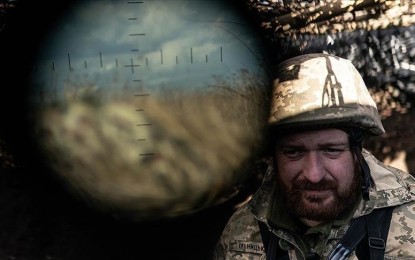
ANKARA – The Russia-Ukraine crisis, which began about eight years ago, has taken on new dimensions following Moscow's controversial recognition of the independence of separatist regions in the country's east.
In a speech late Monday, Russian President Vladimir Putin announced the recognition of the separatist regions of Luhansk and Donetsk, while also questioning Ukraine’s sovereignty and accusing the West of ignoring Moscow’s core security concerns.
He later ordered the deployment of Russian troops to “maintain peace” in the breakaway regions.
Putin’s moves have been widely condemned as serious violations of international law, with Western countries threatening harsh new sanctions.
Viktor Yanukovych’s decision
Russia had a falling out with Ukraine after the former Soviet republic grew closer to the European Union.
In 2013, pro-Russian Viktor Yanukovych, Ukraine's fourth president, announced that he would suspend the EU Association Agreement to prevent the country from turning to the West. This move marked the beginning of a deep crisis in the country's political history.
For months, thousands of protesters gathered in Kyiv's Independence Square to protest Yanukovic's decision. Clashes erupted from time to time between protestors, with pro-Russians also taking to the streets.
When the protests escalated out of control, Yanukovich fled to Russia.
Ukraine is separated geographically between Europe and Russia, and so are the people, who are divided into two camps – pro-Russian and pro-Western.
Later, tensions expanded to Crimea and the eastern Donbas region bordering Russia. The Crimean Parliament decided to hold a referendum that would allow Russia to annex Crimea, but international observers called the vote illegitimate.
Despite the protests of Crimean Tatars and Ukrainians, Russia illegally annexed Crimea following the controversial referendum on March 16, 2014.
The invasion of Crimea by Russian soldiers triggered regional and international condemnation.
Separatists control over eastern Ukraine
Pro-Russian separatists also claim control of eastern Ukraine, including the Donbas region, which they have illegally controlled for the past eight years.
In February 2014, pro-Russian separatists attacked pro-government troops in the Donetsk and Luhansk (Donbas) regions. The two regions are densely populated by people of Russian origin.
According to Kyiv, the separatists received a significant number of weapons and ammunition from Russia.
Separatists in Donbas claimed two so-called states, the “Donetsk People's Republic” and “Luhansk People's Republic,” through a so-called referendum on May 11, 2014.
Between September 2014 and February 2015, Russia, Ukraine, France, and Germany, collectively known as the Normandy Quartet, signed the Minsk Protocol, which effectively halted troop advances and greatly lowered tensions.
However, the agreements could not be implemented, and the confrontations devolved into trench warfare between thousands of soldiers.
Volodymyr Zelensky, a former actor and comedian, was elected president of Ukraine by a large majority of votes in April 2019, with the promise of reintegrating the Donbas region into the country.
In December 2019, the Paris Summit in the Normandy format was held for the first time in three years. During the summit, the leaders of Ukraine, Russia, Germany, and France stressed a complete cease-fire and adherence to the Minsk agreements.
The summit did not stop the clashes, but Russia, Ukraine, and the Organization for Security and Cooperation in Europe (OSCE) later agreed to a comprehensive ceasefire beginning on July 27, 2020, which was maintained until 2021.
However, Russia's military buildup on the Ukrainian border last year escalated the armed conflict in the Donbas region once again.
The US and its European allies warned that Russia was preparing to again invade Ukraine by amassing over 100,000 troops and heavy weaponry in and around the country's eastern regions.
Russia, on the other hand, dismissed all such statements, claiming that it was not preparing for an invasion and accusing Western countries of undermining its security by expanding NATO to its borders.
In 2014, Moscow began supporting separatist forces in eastern Ukraine against the central government. The conflict has taken nearly 15,000 lives, according to the UN. (Anadolu)
